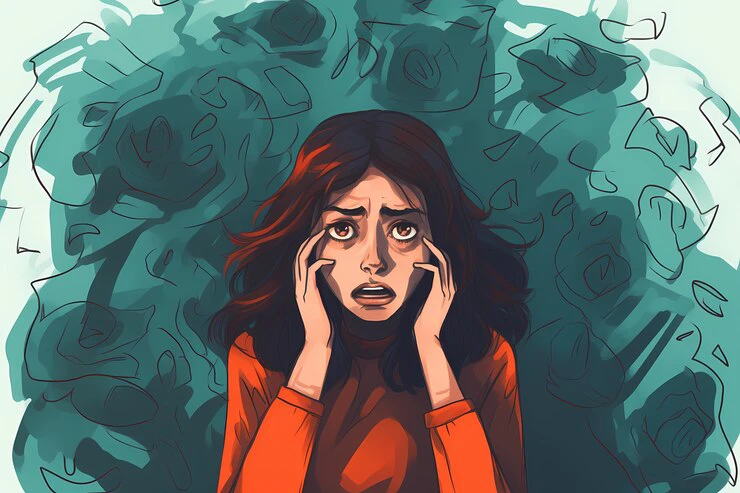Thermal stress is becoming increasingly common due to extreme climate changes. In Costa Rica, the population has just faced a heatwave in May and now must adapt to the early rains of June. This abrupt change not only affects physically, but also has a significant impact on mental emotional well-being and mental health. Understanding how mental stress by temperature changes, and climate changes can affect people’s emotional well-being and mental health, especially the younger population, and comprehending the ways to take care of mental health during these periods is crucial.
What is Thermal Stress?
Thermal stress refers to the tension the body experiences when facing extreme temperatures. During a heatwave, the body struggles to stay cool, which can lead to dehydration, heat strokes, and other physical complications. However, the impact of this does not stop at the body; it also affects the mind through mental stress.
Effects of Thermal Stress on Mental Health
When temperatures are extremely high, both the body and mind face additional pressure. Heat can cause irritability, anxiety, and difficulties in concentration, a mental stress that can disrupt daily activities and even lead to anxiety attacks. Additionally, extreme heat can disrupt sleep, further aggravating stress and mental health conditions. These cases are more common in adolescents, who are already dealing with numerous hormonal and emotional changes, but it is not unusual in other age groups. Mental stress is particularly challenging to manage, and adding thermal stress can pose an even greater burden.
Stress and Mental Health in the General Population
Abrupt climate changes can increase levels of anxiety and depression. Uncertainty and physical discomfort can contribute to stress and mental health issues, especially in individuals already predisposed to these conditions in their mental emotional well-being and mental health.
Extreme heat can reduce productivity in work, academic, or any setting due to physical discomfort and fatigue. This is particularly relevant for outdoor jobs or environments without climate control. These factors lead to mental stress, which not only affects professional fields but also impacts general stress and mental health, adding to the everyday mental stress and further affecting overall well-being.
Mental emotional well-being and Mental Health in Adolescents
Impact of Climate on Adolescents
Adolescents are especially vulnerable to the effects of mental stress due to thermal changes. The transition from a heatwave to the rainy season can destabilize their daily routine, affecting their mental emotional well-being and mental health. Abrupt climate changes can provoke feelings of uncertainty and anxiety, exacerbating existing stress and mental health issues.
Ways to Take Care of Mental Health in Adolescents
- Open Communication: It’s crucial for adolescents to feel they can talk about their concerns. Parents and educators should foster an environment where young people feel comfortable sharing their emotions.
- Maintain a Routine: Despite climate changes, keeping a stable routine can provide a sense of normalcy and control.
- Outdoor Activities: When the weather permits, outdoor activities can help adolescents stay active and reduce stress.
- Relaxation Techniques: Teaching adolescents relaxation techniques, such as meditation and deep breathing, can help them manage anxiety.
Stress and Mental Health in Adults
Thermal Stress at Work
For adults, this stress can affect both work and personal life. Extreme heat can reduce productivity and increase levels of mental stress. During the rainy season, the risk of waterborne diseases can add another layer of concern.
Mental emotional well-being and Mental Health
Mental emotional well-being is crucial for maintaining controlled levels of mental stress and better mental health. Climate changes can destabilize stress and mental health, but there are ways to take care of mental health against mental and physical stress.
Ways to Take Care of Mental Health in Adults
- Adequate Hydration: Staying hydrated is fundamental for mental emotional well-being and mental health, as well as physical health. Drinking enough water helps regulate body temperature and prevent dehydration, which in turn can better manage stress and mental health.
- Adequate Rest: Possibly one of the most important ways to take care of mental health and overall health, getting enough sleep is crucial. Thermal stress can disrupt sleep, so it’s important to create a cool, dark sleeping environment to recover from the day’s strain.
- Regular Exercise: Exercise helps reduce and improve levels of stress and mental health, boosting mood. During extreme heat, it is better to exercise early in the morning or late at night when temperatures are lower.
- Social Support: Maintaining strong social connections can provide emotional support during periods of stress. Talking with friends and family about concerns can help alleviate anxiety, which is a reaction to stress, bringing focus back to the topic of stress and mental health.
Preparation for the Rainy Season
Challenges of the Rainy Season

The transition from a heatwave to the rainy season presents new challenges. Flooding and waterborne diseases are common concerns. Additionally, the lack of sunlight can affect mood and energy, necessitating the implementation of ways to take care of mental health and physical health for our families and ourselves.
Ways to Take Care of Mental Health
- Home Preparation: Ensuring the home is prepared for rain can reduce stress. This includes checking roofs and gutters and having emergency supplies on hand.
- Staying Active: Although the weather may limit outdoor activities, it’s important to find ways to stay active indoors, such as doing yoga or low-impact exercises.
- Relaxation Techniques: Practicing relaxation techniques like meditation can help manage stress during the rainy season.
- Professional Support: Do not hesitate to seek professional help if stress becomes overwhelming. Keeping an emergency contact handy is a fundamental way to take care of mental health, as professionals are a valuable resource.
Building resilience against stress and climate change

Thermal stress and climate changes can significantly impact mental emotional well-being and mental health. It is crucial to adopt effective ways to take care of mental health to manage these challenges, especially during the transition from a heatwave to the rainy season in Costa Rica. Maintaining open communication, following a stable routine, and practicing relaxation techniques are important steps as ways to take care of mental health, although if we mentioned what the ways to take care of mental health would be primary, we would mention sleeping and having an emergency contact. Remembering that mental emotional well-being and mental health are as essential as physical health, and can help face thermal stress with greater resilience.
If you’re looking for more information on how to enhance your physical and mental health, visit our blog for insightful articles and helpful tips. Express Medical is here to support you every step of the way. Contact us today!






